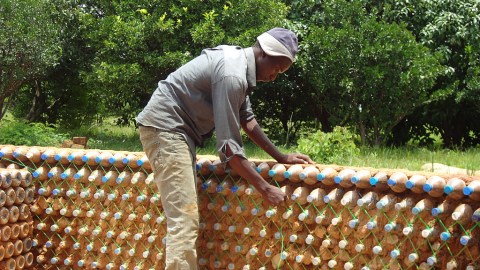Can Green Design Play a Role in Global Sustainability?

Plastic waste is a growing global challenge. It hangs around for years and years, meaning it accumulates and causes problems like leakage into water sources, threatening ecosystems and the people who depend on them for reliable food. In short, plastic is a huge source of waste that we have to figure out how to deal with.
At the same time, we live in a world of perpetual instability, with multiple refugee crises happening and poverty as a regular fact of life. Housing and homelessness are real concerns for entire populations throughout the world. What can be done to help ensure that everyone who needs a home can have access to one?
German-based company Ecotec Environmental Solutions may have just stumbled upon a partial solution to both issues. The company has developed a new way to build houses in Nigeria out of discarded plastic bottles, and the whole process costs about a quarter of the average amount for materials and home construction.

(Aminu Abubakar/Getty Images)
The homes are built by collecting leftover plastic bottles, filling them with sand, placing them together, and then filling in the crevices between the bottles with mud or cement. But just because the process is cheaper doesn’t mean it’s not labor intensive. It takes about 14,000 filled bottles to create a two-bedroom home with a kitchen, a bathroom, and a living room, which is a lot of manual labor.
Before we go about praising these kinds of inventions to high heaven, it would be important to know how sustainable this project is to communities. Will plastic bottle homes be the solution that millions of homeless people worldwide need to find stability, or is it just a cool design idea?
It can’t be denied that green is “in” these days. From purses to architecture, it’s fashionable and hip to use eco-friendly products. There’s a lot of positive things about that trend, and it may be the source of a new way of existing that keeps our planet livable. But it might take time to find the solutions that work best. Plastic bottle houses could be a great place to start, and at the same time it could take years to see if the system truly works for local residents.
**
Stefani is a writer and urban planner based in Oakland, CA. She holds a master’s in City and Regional Planning from UC Berkeley and a bachelor’s in Human Biology from Stanford University. In her free time she is often found reading diverse literature, writing stories, or enjoying the outdoors. Follow her on Twitter: @stefanicox





